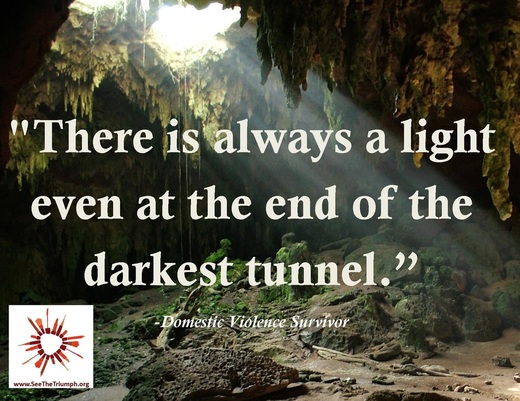|
By Heather Teater, See the Triumph Guest Blogger A domestic violence survivor who participated in the See the Triumph research said, “There is always a light even at the end of the darkest tunnel.” At times, people who have experienced violence and abuse may feel that this light is hard to see. However, in this blog post, I am sharing some important information to help understand survivors who are contemplating suicide, and what resources and information are available to help. A multi-country research team for the World Health Organization has found that, throughout the world, there is a relationship between the experience of violence and suicidality (Watts et al., 2011). Many men and women who are victims or survivors of intimate partner violence may feel that suicide is the only option to escape the terror and pain that comes along with having an abusive partner. However, although the pain of the abuse may feel at times to be too much to bear, there is hope for survivors, and any survivor considering suicide should seek immediate help from a mental health professional or by calling a local emergency hotline or 9-1-1. No matter what you may have been told, your life matters, and help is available. While there is little to no research regarding exactly what might drive a victim or survivor of intimate partner violence to consider or complete suicide, one could intuitively see why trying to leave this world forever might feel like the only way to end the agony of being victimized. Some men and women do not seek help from others because they believe that they deserve the violence and abuse being perpetrated against them. Nobody deserves to be victimized. There is nothing you could do that would justify the verbal, emotional, sexual, or physical abuse that may have been perpetrated against you. Those who are experiencing abuse may feel that they lack the support they need to have a life worth living. Some may have partners who isolate them from their friends and family so that they feel as though they have nowhere to turn. Others may have friends and family to whom they have tried talking about their abuse but, for whatever reason, those people have been unsupportive or unresponsive. Due to the stigma that often comes with being a victim of IPV, victims and survivors alike may struggle to share their stories with others for fear of judgment or blame. When one is left feeling alone and unsupported, sometimes it is difficult to imagine being able to handle this burden alone. However, you do not have to go through this alone. There are shelters for battered men and women designed to keep you safe as you determine your next steps. There are victim advocates who can help you through the legal process of protecting yourself from your spouse. There are support groups for those who have been victimized by people they loved and trusted. These groups are filled with men or women who will not only believe that the experiences you share are very real, but who will also understand the daily struggle that you have lived with for so long. There are people out there who will believe you and support you in whatever ways they can. For some, the consequences of trying to leave an abusive situation are terrifying, and those fears are justified. The threat of harm when attempting to leave a violent partner is very real; to deny that would be to perpetuate the ridiculous idea that victims should make the “simple” decision to leave an abusive relationship. I understand that it is not that easy. However, with the support of others it is possible to take the steps necessary to escape domestic violence. I would be lying if I said that this is a simple process with cookie-cutter steps that everyone can follow. However, I will make one blanket recommendation for everyone: The safety of you and your family should always be on the forefront of your mind. If possible, find a trained professional to help you develop a safety plan. If you are unable to seek professional help at this time, you can find a template for safety plans here: http://www.ncdsv.org/images/DV_Safety_Plan.pdf. You can also call the Domestic Violence Hotline at 1-800-799-7233. Contacting a local shelter or victim advocate can also be a helpful way for you to gain support throughout this process. There is hope for everyone suffering through intimate partner violence. Do not give up on yourself. You have had the strength to make it this far through the abuse, and you have the strength to regroup and make it to the peaceful life that you deserve. There may be other reasons that one could feel that suicide is the only option out of the hell that is intimate partner violence. If you have considered suicide as an option to escape your situation, please seek help by calling the National Suicide Prevention Lifeline at 1-800-273-8255 or using one of the resources below. Resources
References
 Heather Teater recently completed her Master's degree in Couple and Family Counseling in the Department of Counseling and Educational Development at the University of North Carolina at Greensboro. Comments are closed.
|
Archives
July 2024
CategoriesAll About Intimate Partner Violence About Intimate Partner Violence Advocacy Ambassadors Children Churches College Campuses Cultural Issues Domestic Violence Awareness Month Financial Recovery How To Help A Friend Human Rights Human-rights Immigrants International Media Overcoming Past Abuse Overcoming-past-abuse Parenting Prevention Resources For Survivors Safe Relationships Following Abuse Schools Selfcare Self-care Sexual Assault Sexuality Social Justice Social-justice Stigma Supporting Survivors Survivor Quotes Survivor-quotes Survivor Stories Teen Dating Violence Trafficking Transformative-approaches |
Search by typing & pressing enter



 RSS Feed
RSS Feed